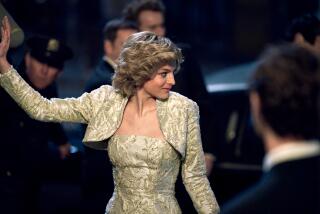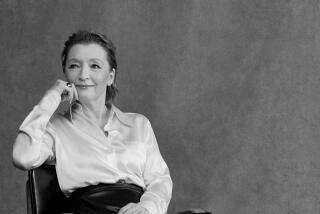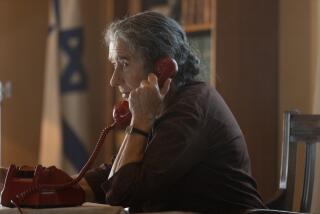Softened by time
There is far more softness than steel in “The Iron Lady,” starring Meryl Streep as the iconic British Prime Minister Margaret Thatcher. The film catches her long after she’s left the public eye, and rather than an examination, or an assessment, of her politics, it instead offers up an affecting if not always satisfying portrait of the strong-willed leader humbled by age.
Director Phyllida Lloyd and screenwriter Abi Morgan have discarded most of the conventions of film biographies and chosen to construct more of a memory poem. It makes for a movie that is highly personal in every sense of the word. Even the political highs and lows that come to Thatcher in flashbacks are of a more private sort: how isolated she felt as a woman in a man’s world. Why she was willing to lose the hat, but not the pearls, during a campaign media makeover.
Lloyd and Morgan’s intention is telegraphed from the opening scenes, when a simple trip to the grocery store for a now-unsteady Thatcher becomes a confusing difficulty for her and a frightening surprise for her caretakers when they discover she’s gone. The movie unfolds over just a few days plucked from the filmmakers’ imaginations, looking in on Thatcher when she finally starts packing up her late husband’s clothes. As happens in times like these, small things trigger memories, the distant past coming more easily to mind than the day’s agenda. She finds herself frequently drifting back in time, which the director uses as a device to fill in the primary trajectory of her roughly 40-year political career -- snapshots of various triumphs, her failures less so.
Back in present day reality, or the blurred version within which Thatcher now exists, she creeps around her house as if she were being watched. And when no one is looking, she carries on conversations with her much-loved Denis. Jim Broadbent is wonderful as Thatcher’s husband and confidant, with his amused smile and crisp common sense defining “devoted” quite succinctly. It all serves to humanize her starched and stolid public face.
The notion of social class and the ways in which one transcends that, or tries to, is thrown into the mix but, as with too much else in the film, is never thoroughly tossed. Thatcher was a shopkeeper’s daughter, watching her father work long hours. As the daughter of a small business owner, she had little patience with the labor unions that she felt were breaking the country’s economic back. Though she never identified herself as a feminist, she always felt the outsider in a Parliament dominated by Britain’s mostly male upper echelon. But the implications never hold the filmmakers’ attentions for long.
Designer Marese Langan (“The Boy in the Striped Pajamas,” “A Mighty Heart”) does a remarkable job of taking away and putting years on Streep as she moves from Thatcher’s late 30s to her 80s; makeup has gone a long way to help transform the actress (though the irregular teeth are a bit disconcerting at first). But mostly, it is Streep’s uncanny ability to disappear inside her characters that is striking. (Alexandra Roach and Harry Lloyd play the Thatchers as a young couple.)
Because the film moves between so many time periods, the task for production and costume crews, headed by Simon Elliott (“Bleak House”) and Consolata Boyle (“Angela’s Ashes,” “Into the West”) respectively, was substantial as well, and the effects do an excellent job at making the various eras distinct. Director of photography Elliot Davis (“Out of Sight,” “Twilight”) keeps the look throughout very clean. Together, they create the sense of a carefully manicured life where nothing seems frivolous. Even the children -- or so you sense, when Thatcher’s daughter Carol (Olivia Colman) drops by to check on Mum, keeping her frustration in check.
This is the director’s second feature film and the second time she’s had Streep as a star. While Thatcher is a far different woman than the hippie-expat-mom who favored ABBA and anchored 2008’s fizzy musical “Mama Mia!,” it suffers from some of the same meandering style. Perhaps because of Lloyd’s theater background, both films feel like a series of loosely linked set pieces -- plays in 15-or-so acts. That leaves the boat feeling rudderless, despite its very shiny brass battlements and beautifully waxed decks.
What helps elevate the film is the searing insight Streep brings to Thatcher’s aging; she catches every one of the emotional crosscurrents that get to the truth of the matter. But if you come expecting keen insight into the intrigues of her very long political life, or even something as simple as why the Soviets dubbed her the Iron Lady, consider a trip to the library instead.
--
--
‘The Iron Lady’
MPAA rating: PG-13 for some violent images and brief nudity
Running time: 1 hour, 45 minutes
Playing: At ArcLight Cinemas, Hollywood; the Landmark, West Los Angeles
More to Read
Only good movies
Get the Indie Focus newsletter, Mark Olsen's weekly guide to the world of cinema.
You may occasionally receive promotional content from the Los Angeles Times.










